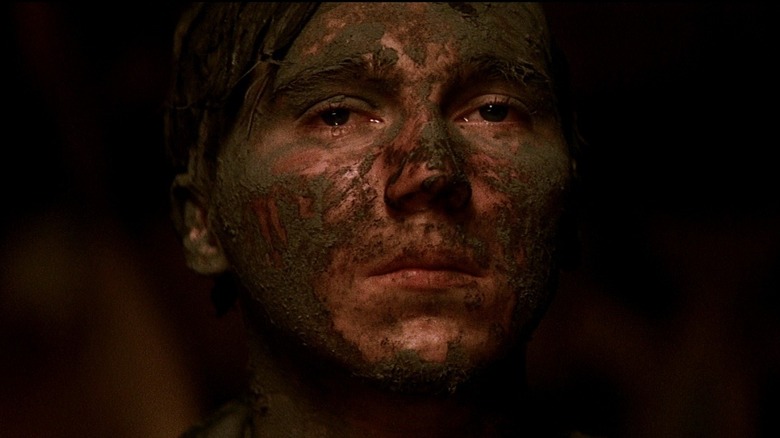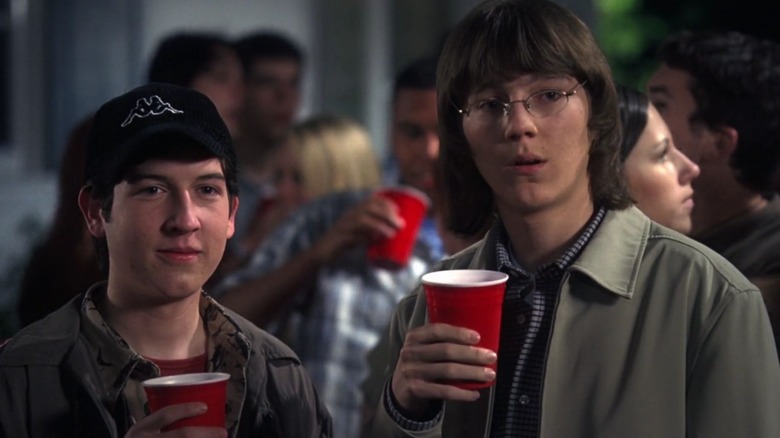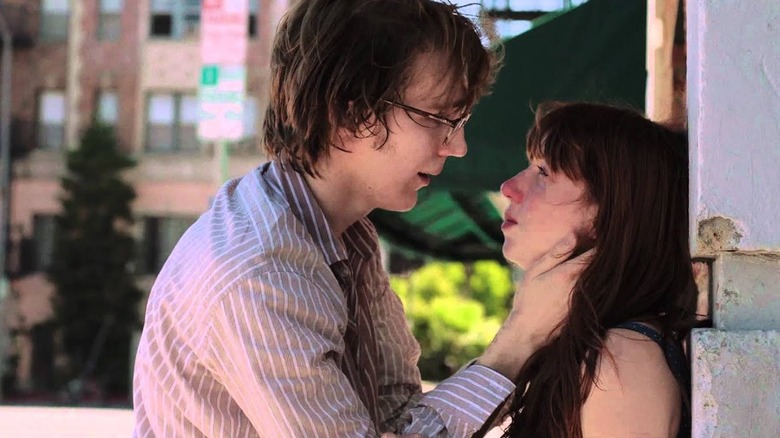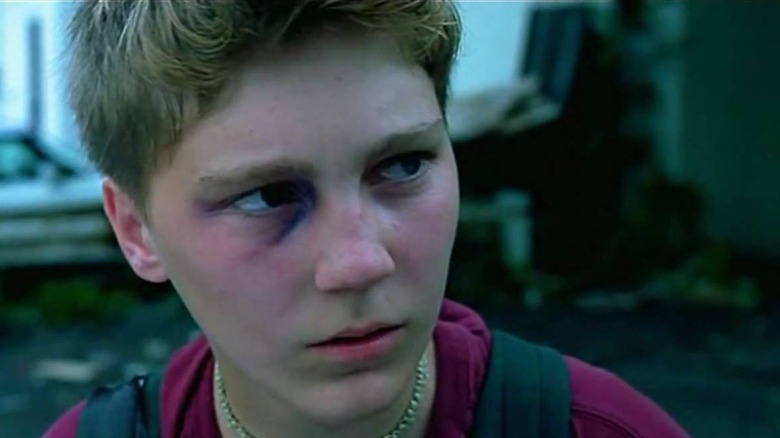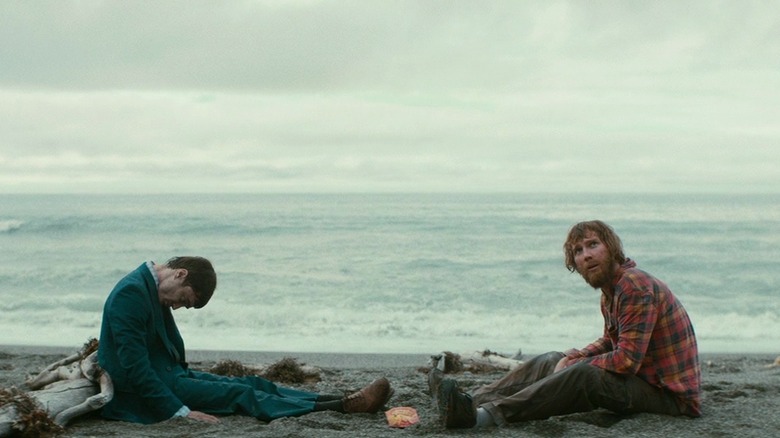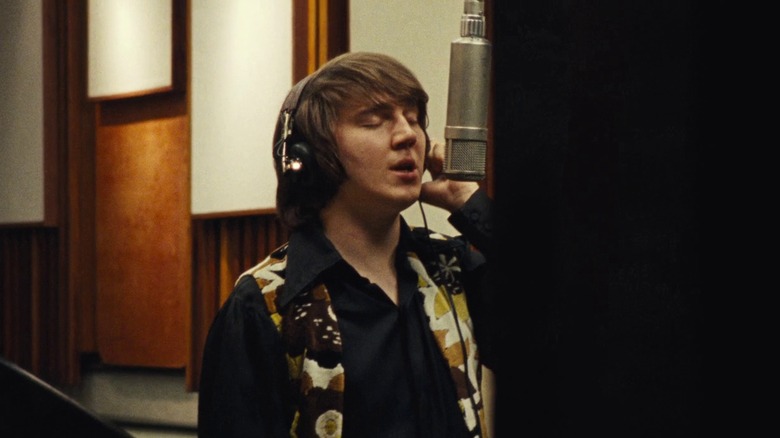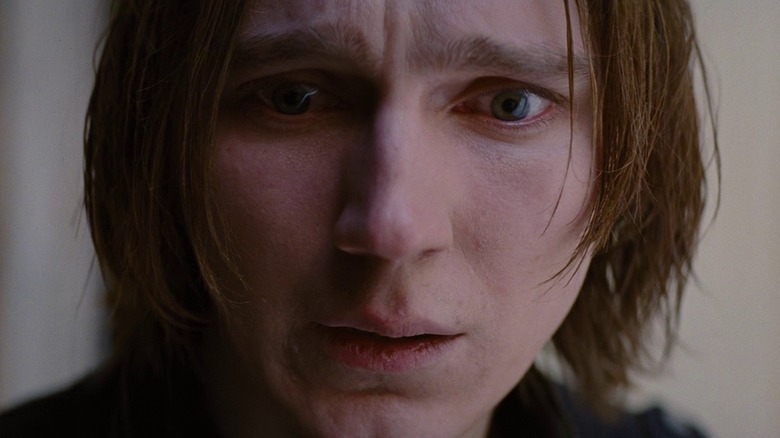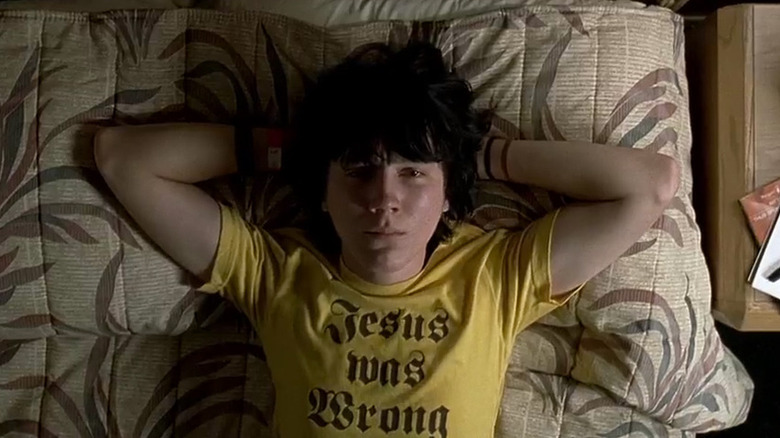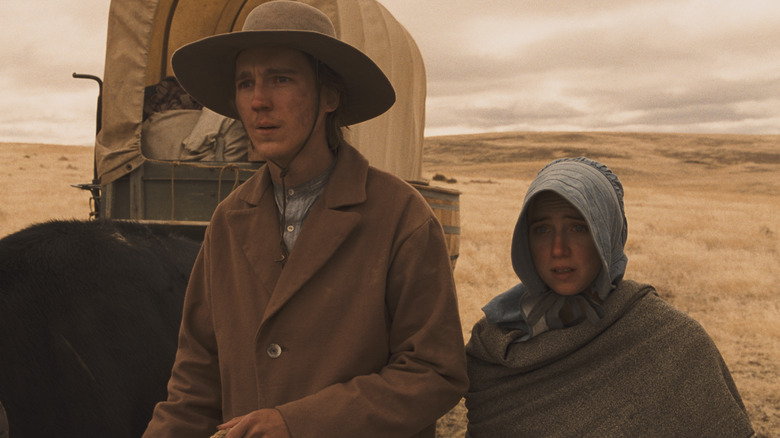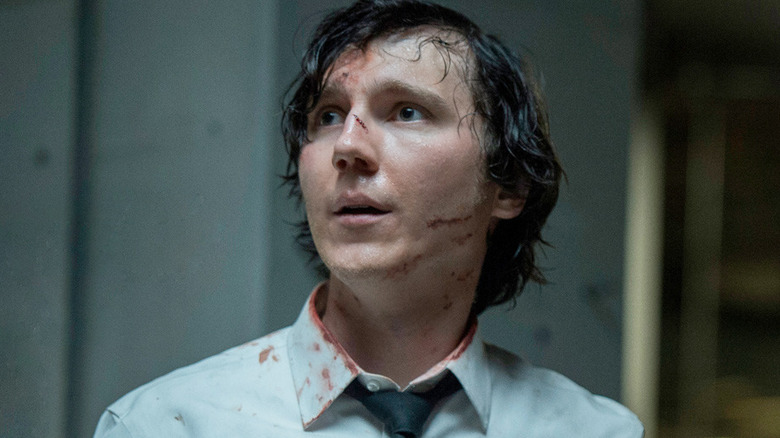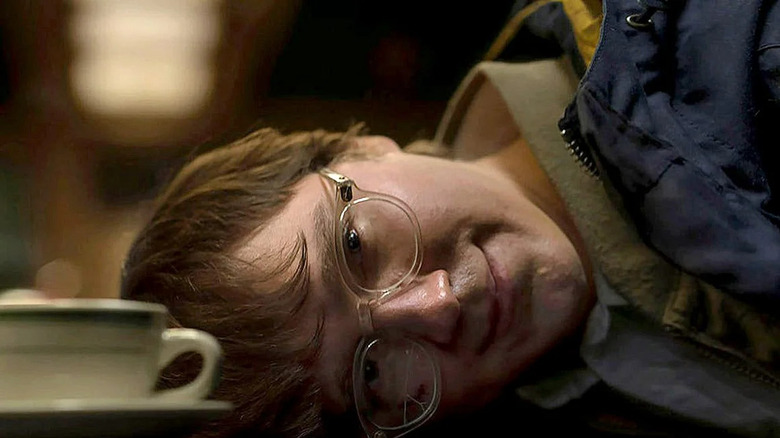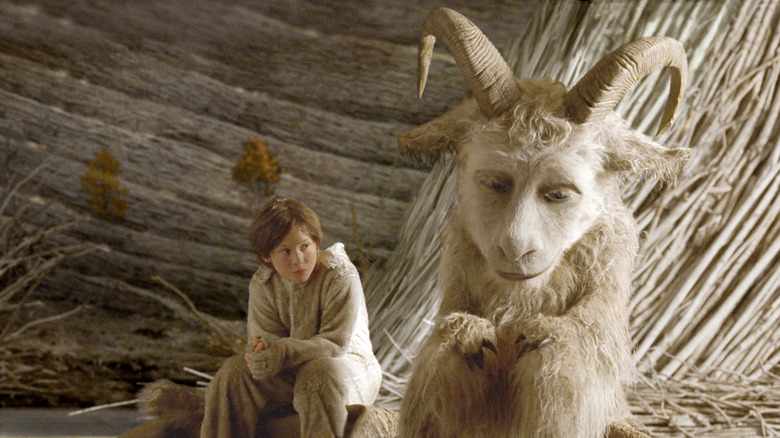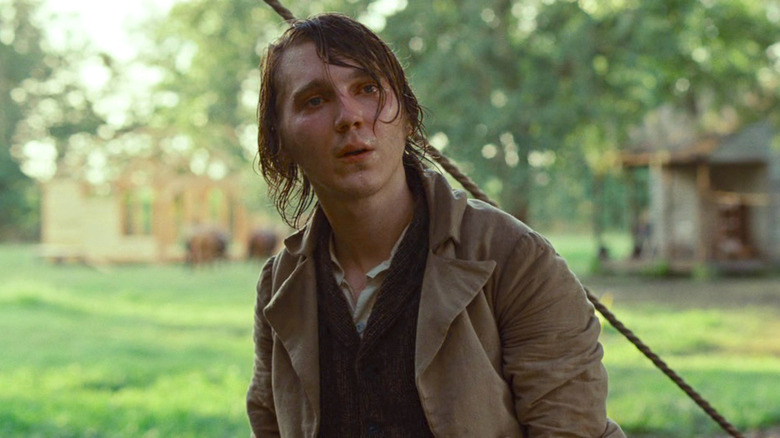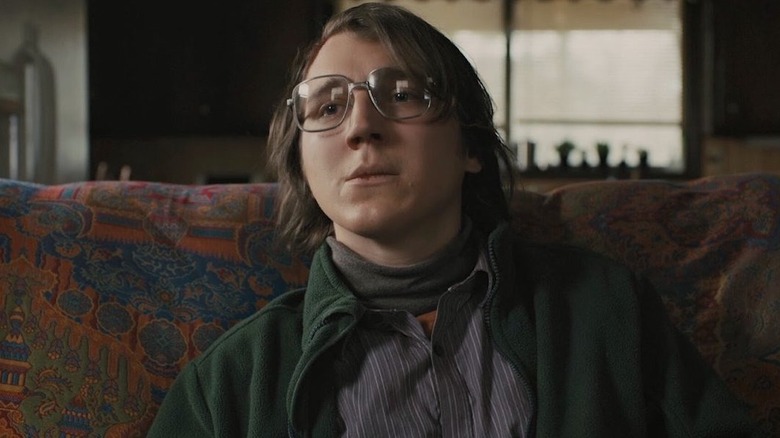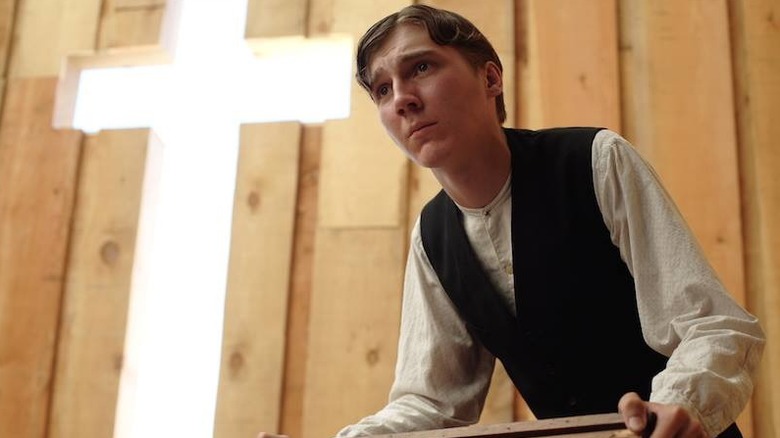14 Best Paul Dano Movies Ranked
Since 2008, movie stars get minted by superhero movies. Chris Evans had appeared in "Not Another Teen Movie," Danny Boyle's "Sunshine," and "Fantastic Four" before he donned a suit and shield in "Captain America: The First Avenger." That made him Chris Evans. The casting of Robert Pattinson as Batman drew fan ire on Twitter, but mostly because many remembered him as a brooding, glittery vampire. Pattinson collaborated with the electric Safdie Brothers and Robert Eggers before putting the cape and cowl on. He's a superstar once more.
This is all worth mentioning because Paul Dano also had his superhero moment in 2022. Dano plays The Riddler in Matt Reeves's blockbuster noir "The Batman," effectively reintroducing himself to mainstream audiences. The irony in this is the sterling resume Dano has built between blockbuster projects. Dano's filmography is a master class in curation. It jumps from genre to genre and includes box-office smashes and underappreciated gems. He has impeccable taste in directors and always places his work on their wavelength. In another universe, Paul Dano is a minted movie star, with or without "The Batman." In this one, we'll celebrate him anyway.
Here are the 14 best Paul Dano movies, ranked.
14. The Girl Next Door
Some films are minted classics from the jump. Others appreciate quietly (think "The Night of the Hunter," a movie so poorly received that Charles Laughton never made another — it's now in The Criterion Collection). And then some films seem to inexplicably become cultural touchstones, that come out of nowhere to be answers to bar trivia questions and casual conversation pieces. "The Girl Next Door" is one of those films.
There's no point in wondering if you've seen it. If you're between the ages of 27 and 40, it's a film you caught in snippets on TV or saw in theaters, or rented via Netflix once. Luke Greenfield's tale of a type-A high schooler (Emile Hirsch) who falls for his neighbor, a one-time porn star (Elisha Cuthbert), has lingered with millennials. There are several reasons why. The script, co-written by "The Kids Are All Right" scribe Stuart Blumburg, is infinitely more graceful than one would guess. It hones in on the ways pop culture makes it difficult for kids to stay young, an exploration that's only more resonant in 2022.
It's the cast that puts "The Girl Next Door" over the edge, though. The early-career work of Timothy Olyphant, Olivia Wilde, and Paul Dano is both splendid and surprising. Dano, in particular, underplays the nerdy Kiltz to the point where he springs character developments like snare traps. It's a level of nuance you don't find in the era's other raunchy sex comedies, and it's a lynchpin of why "The Girl Next Door" endures for so many.
13. Ruby Sparks
Paul Dano and Zoe Kazan are one of the century's most endearing and enduring Hollywood couples. Their relationship remains gossip column fodder, but it's far more interesting as a frank portrait of long-term commitment and collaboration bastion. Kazan and Dano have made three projects together. They appeared together in "Meek's Cutoff." The most recent, 2018's "Wildlife," is Dano's directorial debut (co-written by Kazan) and an absolute stunner. The other, no less affecting, is "Ruby Sparks." "Sparks" couldn't be farther in tone from "Wildlife" yet, at its core, it's asking similar questions in very different font types.
"Wildlife" concerns the dissolution of a marriage and explores the sacrifices we endure for stability and companionship. Valerie Faris and Jonathan Dayton's sparkling romantic comedy, by contrast, wills both into existence. "Ruby Sparks" concerns a novelist named Calvin whose love life fails to achieve lift-off. Inspired by his therapist, he pens the story of a woman who he christens Ruby Sparks (Kazan). When Calvin wakes the next day, she's leapt off the page and into real life. The catch? She's still beholden to whatever Calvin writes her to do. Calvin's manipulation of Ruby begins playfully enough, but it quickly dovetails into a horror show of manipulation and coercive control. The tone remains comedic; the subtext doesn't.
Love is not an act of jurisdiction. It's a collaboration. When that deteriorates, there are two options: dissolution or domination. Kazan and Dano have documented this beautifully across two wildly different but dissimilar projects. That takes bravery and affection.
12. L.I.E.
To call "L.I.E." a tough watch is an understatement. Michael Cuesta's drama (which is short for "Long Island Expressway") isn't difficult to sit through because of its subject matter, although that includes pedophilia and suicide. What's disquieting — and essential — about most of the 2001 film is how deeply it mines the shades of gray that manifest between its characters.
"L.I.E." is about a juvenile delinquent named Howie (Paul Dano) and a sexual predator named Big John (Brian Cox), but what that relationship is and who these characters are isn't clear. What is crystal clear is a yearning for connection that becomes morally complicated and heartbreaking, even as it veers towards the queasy.
Until its third act (which feels like a cop-out), "L.I.E." searches for and finds humanity where a void should be instead. "L.I.E." is one of Dano's first films and he makes a deeply audacious debut. Cast alongside and opposite Brian Cox, Dano finds all of Howie's exposed nerves and then buries them under adolescent bravado and learned dissociation. He's made better movies than "L.I.E.," but few actors' debut performances have been more notable or remarkable.
11. Swiss Army Man
"Swiss Army Man" is a non-stop masterclass in subverting audience expectations. It opens on a man (Paul Dano) attempting suicide. It then finds its way into a flatulent corpse (Daniel Radcliffe) that can be manipulated like a Swiss Army knife and washes ashore in the nick of time. The movie only gets wilder and more subversive from there.
A tangent: in 2022, everyone on Film Twitter talked about "Everything Everywhere All At Once" — and with good reason. That movie was made by Daniel Scheinert and Dan Kwan (collectively known as the Daniels) and "Swiss Army Man" is, in its own fart-filled way, the blueprint for the euphoria they create through that later project. Daniels treats every element of their films — be they gassy corpses or raccoons that cook — with maximum sincerity. If something shows up in their movies, it will make its voice heard in the third act, however improbable. This is the charm of the "Swiss Army Man" experience, and it's one that Dano leans into. The actor has arguably never been simpler or more appealing than he is here, in possibly his strangest film. That's a totally different kind of audience subversion — and one we're here for.
If you or anyone you know is having suicidal thoughts, please call the National Suicide Prevention Lifeline at 1-800-273-TALK (8255).
10. Love & Mercy
In "Walk Hard," Sam (Tim Meadows) reverently declares that "Dewey Cox has to think about his whole life before he plays." The movie then flashes backward and effectively kills the music biopic. This is only a slight exaggeration. What "Walk Hard" posited in gleefully satirical tones is that an attempt to cram an artist's life, career, and legacy into one two hour movie is an absolute fool's errand. Many have tried to. Few have succeeded.
In "Love And Mercy," director Bill Pohlad's look at Brian Wilson's life finds a compelling work-around — tell the story as a diptych. The compelling project (co-written by the wonderful director Oren Moverman) explores the highs and lows of The Beach Boys frontman's life by turning its focus to both the late '60s and '80s / early '90s, casting Paul Dano and John Cusack as the mercurial musician in different stages of his life. Most interestingly, though, the film doesn't ask Dano and Cusack's performances to echo one another. Instead, each actor offers their take and the film builds stylistically around them. Cusack's dry and knowingly stoic work gets matched by broad but appealing turns from Paul Giamatti and Elizabeth Banks. The '60s section is more technicolor and nuanced, informed by Dano's soul-exposed performance and the sonic magic of "Pet Sounds" recording sessions.
It's in these moments and through Atticus Ross's impeccable score that "Love & Mercy" makes its intentions clear. It's pedestrian to show us a great musician's life. It's more vital to show us how they heard the world and what that cost.
9. Looper
"Looper" is a tremendous film that's suddenly far more resonant; in it, an assassin named Joe (Joseph Gordon-Levitt) is faced with killing his older self (Bruce Willis). Several plot twists later, both Joes are seated at a diner reminiscing about their lives, past and present. "How's your French coming?" Older Joe asks. "Good. You gonna tell me I oughta be learning Mandarin?" Joe sneers back. Older Joe half-smiles and half grimaces: "I never regret learning French." At that moment, Older Joe's entire life is behind and before him. He is looking back by being present. Willis sells the complexity of this insane but resonant beat hook, line, and sinker.
You might know where we're headed with this — maybe you're like Old Joe in that way. Willis revealed his aphasia diagnosis in April of 2022, a degenerative condition affecting memory and mental cognition. It's possible, in the strictest sense, that Bruce Willis will never be able to look back on the whole of his life the way Old Joe does in "Looper." Movies have given us the power and beauty of a moment the performer will never get. It's heartbreaking. It's poetic. It's the worst and best kind of art all at once.
We're talking a lot about Bruce Willis in a piece about Paul Dano. But, just as Dano's best gift to "Looper" is giving space and taking stage whenever's needed, we figured he can hold the backseat down for one entry. See "Looper" for Dano, sure. But please, please watch it for Bruce Willis, too.
8. Little Miss Sunshine
Few actors do more with silence or screaming than Paul Dano. In "Little Miss Sunshine," the thespian builds from one modality to the other in one stunning cinematic moment.
Dano's Dwayne Hoover has taken a vow of silence until he achieves his goal of becoming a fighter pilot. He maintains that silence for much of the Hoover family's road trip from New Mexico to California, a trip taken in service of Dwayne's younger sister Olive (Abigail Breslin). Tensions are running high after a series of mishaps including a broken horn and the death of Dwayne's grandfather (yes, this film is a comedy). At their tail end, Dwayne discovers he is color blind. This renders him ineligible for flight school and his dreams are essentially dead. Fleeing the family's VW Microbus, Dwayne breaks his silence with a piercing shriek.
We're describing this moment in detail because words don't do it justice. It's rare when you can pinpoint the moment an actor becomes a movie star. It's rarer when that moment holds a power that transcends the movie it's in. Good as "Little Miss Sunshine" is (and it is very, very good), it's best as a film that cements the cinematic legacies of its cast. Abigail Breslin remains a dynamic talent. Toni Collette and Steve Carrell are known dramatic powerhouses. And Dano has a career so varied and excellent it's worthy of a "best films" list. All it takes is one moment to make a performer.
7. Meek's Cutoff
Kelly Reichardt is a maestro of the American Northwest. The minimalist, Florida-born film director orchestrates every element of her chosen setting like instruments in a concerto. She renders 1820's Oregon intimate and dangerous in 2020's "First Cow." The modern-day Oregon wilderness becomes both ally and foe to two environmentalists in 2013's "Night Moves." In 2011's "Meek's Cutoff," though, Reichardt does more than effectively evoke the infamous Oregon Trail — she challenges our notion of what going west meant and what it felt like. The land here wears those who travel upon it down. When we first meet Stephen Meek (Bruce Greenwood) and the travelers, he is shepherding (Michelle Williams, Zoe Kazan, and Paul Dano, among them), striding proudly across the terrain. By the film's end, the travelers, now lost, stumble and struggle to move. There is no romanticism present. There is only a need to survive.
Reichardt shoots this degradation in the aspect ratio of classic westerns, challenging and subverting the iconography that we've grown accustomed to as viewers. And though "Meek's Cutoff" is, hands down, Michelle Williams' movie, Dano acquaints himself nicely as a traveler who feels his American dream slipping out of his fingers and into the wilderness beyond.
The West, and Reichardt's film, are appropriately unforgiving.
6. Okja
Bong Joon Ho is a monster-movie master. To be clear, all of the Oscar-winning filmmaker's projects are monster movies. In "Parasite" and "Snowpiercer," class warfare is the monster. In "Memories of Murder," both a serial killer and the society that birthed him are boogeymen. Joon Ho's creature feature work (which, for our money, is comprised of "The Host" and "Okja") is the director's most potent and heady mix of horror and heartwarming. It offers Joon Ho the chance to stage jaw-dropping set pieces that shift his social commentary to overdrive. That's never clearer than in the bleak third act of "The Host" or, particularly, "Okja." This is a movie where a mutant pig careens through a crowded South Korean mall and, in doing so, cements the movie's position about acceptable thresholds of animal cruelty. There's nothing else quite like it.
It's also a great Paul Dano showcase. Dano is capable of naturalism, but the actor is at his best in projects which have room for stylistic stretching. As the well-meaning yet hysterically righteous activist Jay, Dano is tasked with being a genuine firebrand and gentle parody of one. He succeeds on both counts. It's masterful work that matches his equally masterful director in lockstep.
5. The Batman
In "The Batman," vengeance is influential. The Dark Knight embodies vengeance; his signal isn't just a sign — it's a warning. When that Batman symbol light hits the sky, it becomes a sword of Damocles for those who would lord power over the helpless. But Batman doesn't use that sword to mortally wound his adversaries, even at his most rage-filled.
Paul Dano's Riddler is the opposite. Warnings aren't enough for him. Gotham has been built on corrupt foundations by men who never believed they'd pay for their crimes. Influenced by Batman, he becomes the proverbial sword and cuts a trail of righteous fury through the city, leaving bodies and clues in his wake. To hear him tell it, Batman was his partner. "We've been doing this together," Riddler swoons, "I'm not physical. My strength is [my brain]. I had all the pieces, I had the answers, but I didn't know how to make them listen. You gave me that ... you showed me what was possible. All it takes is fear and a little focused violence."
Given that what follows Riddler's speech is a literal assault on the government and civil liberties, it's impossible to not draw parallels to the January 2022 Capitol insurrection. The direct comparison is welcome. There are many reasons Matt Reeves' stirring blockbuster is one of the most successful superhero films of recent years, but point of view is chief among them. Reeves asks us to consider not only what we stand for, but how our voice affects others — even the people we're not thinking about. Here's hoping it influences many.
4. Where The Wild Things Are
In "Where The Wild Things Are," childhood is monstrous. "Monstrous" — it's a word with a horror-filled connotation. Monsters are the creatures that go bump in the night, that manifest in nightmares or human form. Yet part of becoming an adult is understanding the monsters that live within us, the ones which form at birth, childhood, or both. If you're lucky, you come to love that monster (or at least offer them a seat at the table of your life). That's what Spike Jonze's movie is about. Yes, "Where The Wild Things Are" is a joyous ode to the fierce and frightening journey that is youth, but it's also a film that acknowledges that Max, its lead, is monstrous. At no point does it judge that.
That's a lot of terrains for a family-friendly film to cover. That's why "Where The Wild Things Are" is an exquisite film. It realizes its complicated thesis through searing cinematography and practical effects that are as imposing as they are dazzling. It has a feral heart and wise mind. More than anything, it loves its monsters very much, real or imagined. And it makes us love them too.
3. 12 Years A Slave
"12 Years Of A Slave" makes an untold number of radical, heart-shredding storytelling decisions. There are single-take shots of slavery and its inhumane abuses. There's a hanging sequence that is both a horror film in miniature and a suspense masterclass all at once, a mercilessly yet necessarily long stare into the heart of American history. There's also, most radically, space for Black intimacy and joy. Before the audience sees a single act of violence perpetrated against Black bodies, they bear witness to Solomon (Chiwetel Ejiofor) and Anna (Ashley Dyke) treating each other tenderly despite themselves being treated savagely. It's beautiful, surprising, and ultimately shattering.
These are the grace notes that don't just distinguish "12 Years A Slave" from any narrative of slavery that's come before it; they make it more cathartic and healing, even in its unflinching darkness. A large swathe of that darkness comes from Dano, who plays the loathsome slaver and chief carpenter Tibeats. Tibeats savors his every hateful word, high on his inhumanity. Whether he's repurposing spirituals as hate speech, relishing his work, or, yes, committing murder, Tibeats embodies white power and privilege in one person. Dano makes Tibeats recognizably human but, crucially, makes him unworthy of empathy. The actor has played dark characters before and after Tibeats, yet this is his one true embodiment of pure evil, and it is mesmerizing.
2. Prisoners
There is no escape in "Prisoners" — there is only the hope of rescue. Some characters are rescued from kidnappers, while others stay trapped. And almost every character in Denis Villeneuve's masterful thriller feels trapped in a psychological prison of their twisted construction, from the rageful and grieving Keller Dover (Hugh Jackman) to the stoic Detective Loki (a great Jake Gyllenhaal). Villeneuve films each character in extreme close-ups throughout. They're claustrophobically held in his frame, fiending for release that never comes. It sounds exhausting because it is.
If we've spent more time describing the mood of "Prisoners" than its plot, that's by design. For one, we don't want to spoil the plot's deeply nihilistic twists. Most of all, the story — which concerns two girls who go missing in the heart of Pennsylvania — is a catalyst to drum up existential dread. At the heart of this is Paul Dano's Alex Jones. A young man suspected of abducting the aforementioned women, Dano tiptoes the line between terrifying and helpless. His face and relative silence are unreadable (until they aren't). He twists the audience's heart in knots merely by existing. It's hard to understate the command and talent Dano displays here. The performance may not be flashy, but it's a tightly coiled inferno. That's better.
1. There Will Be Blood
"There Will Be Blood" takes place in 1898. "There Will Be Blood" is about 2022. So long as the oil industry burrows deeper into the fabric of American existence and prosperity, Paul Thomas Anderson's classic will be about who we are, not "were." It gives zero quarter, and its elegant horror never waivers on repeat viewings. It is essential modern cinema.
It is also Paul Dano's best movie, and not only because it's peerless. Dano was originally cast solely as Paul Sunday, the man who tells Daniel Day Lewis's Daniel Plainview of an oil deposit on his family's California property. Kel O'Neill filmed for several weeks as Eli, Paul's parish-leading brother, before departing the project amicably. With four days and seemingly minimal fear, Dano stepped into the pivotal role.
Eli Sunday has, unsurprisingly, become the template for Dano's most marquee work. It's a performance that matches the forever-in-beast-mode of Daniel Day-Lewis at his most deliberately monstrous. Dano's Sunday is an operatic blend of vein-popping theatrics and subtle, white-hot heartbreak. He oozes feeling even when still, like a freshly tapped petroleum reservoir. You could argue Dano had no more mountains left to climb after "There Will Be Blood." We'd argue he made some. Dano's Riddler is a triumph of iconic discontent. "Swiss Army Man" is one of the 2010s most rapidly-appreciating efforts. Dano never had to top "There Will Be Blood" because he kept fixing ways to match it. If we're lucky, he won't stop for some time.
